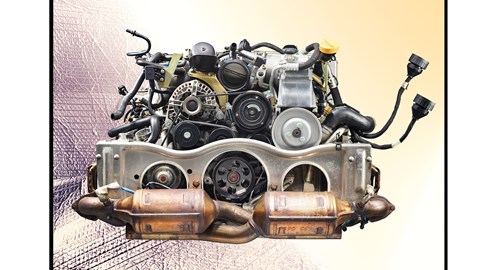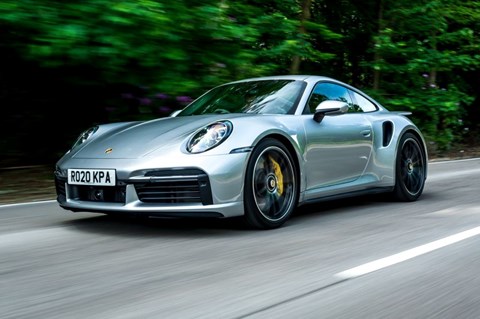► Motorsport first to benefit from Porsche non-fossil fuel
► Work underway on huge production facility in Chile
► Could also extend the life of historic road cars
The answer to Formula 1’s quest for a way to go greener without losing the primal thrill of traditional engines could be just about to arrive from Chile, where work has started on the plant producing synthetic fuels for a joint venture involving Porsche and Siemens.
Next year the Haru Oni project in Punta Arenas is expected to produce 130,000 litres of what Porsche calls eFuels – synthetic fuel created by splitting water into oxygen and green hydrogen, then combining CO2 with the green hydrogen to produce synthetic methanol, which is then converted into eFuel, which can be used in regular combustion engines. That will increase to 55 million litres in 2024 and 550 million in 2026.
Porsche R&D chief Michael Steiner told journalists: ‘We have been in talks with Formula 1, and we would be able to give them a share, but not just now in the beginning. It’s not a huge amount. We are in talks.’

First priority will be providing the fuel for 2022’s Porsche Supercup race series. ‘Our next step could be our Porsche Experience Centres, where our customers could benefit from such renewable fuels. Another idea will be “first fill” of our cars, in the plant before they get given to customers. But sooner or later we will have to find distribution ways to get this to the fuel tank. Most probably that will be a kind of blending, so a certain share of fuel will be based on renewable sources.’
Dr Steiner added: ‘Besides automotive, we have already good talks with companies that are in aviation, European and US-based, and also shipping companies. Some of the companies in those industries are looking to follow us. In shipping it wouldn’t be the eFuel we use in cars, but maybe e-ethanol. In principle there is interest. But what about regulation, what about taxation? It has to be renewable and sustainable, but also financially feasible.
'There is some interest from other [automotive] OEMs. But looking at the volumes we will see from our pilot plant, we are telling them not now – just wait a little bit. If there is interest we will look first of all to our sister companies within the VW Group.’
Would it be realistic to think that this breakthrough could mean we no longer have to expect a ban on new combustion cars? Probably not. ‘I would be happy if I could drive my 911 in maybe 10, 20 years from now based on eFuel. That would be really good in two ways. First, if you are talking about cars that already exist, the CO2 footprint for building this car is already behind us, and to use the car with renewable fuel would be the smartest way to save the world, instead of building new and new and new.
‘I don’t know whether you could convince mayors of big cities and regulators to allow us to use ICE cars in the future. We are doing a lot of talks to try to convince that the problem is not the ICE itself, it’s the fuel you burn, based on fossil resources.’
Porsche invests €1bn in decarbonisation
Porsche used its annual press conference in March 2021 to double down on its commitment to sustainability, while also making clear it believes there’s much more to CO2 reduction than electrification alone. It’s convinced combustion engines running on synthetic fuels also have a role to play, in motorsport, in road cars and in classics, too.
‘The problem is not the internal combustion engine itself, it's the fuel you burn,’ explains Dr Michael Steiner, Porsche’s R&D boss. ‘We have to do a lot of work in order to come down on CO2 emissions, definitely, and we are totally committed to this. But the problem is not the engine itself.
‘We would like to show that e-fuels are a feasible technology with certain volumes – there are a lot of questions, and people who are not convinced that this will work. So, we have to show them. The decision is not one to be taken by our side alone, of course, but we will do all we can to see if this is a solution for highly emotional cars, for racing, and also for on road cars. Our job, at least as research and development, is to show what's technically possible. The next step is to convince people that there might be not the need to ban everything.’
As things stand, the UK government has moved to ban the sale of new cars powered by combustion engines alone from 2030.

Synthetic fuels are used by engines in the conventional way, creating heat, power and emissions, but their production involves processes that are carbon-neutral or even capable of off-setting the CO2 released during combustion. Audi’s been working on such fuels for a number of years, and Porsche has announced it too is stepping up its R&D spend on the technology.
CEO Oliver Blume: ‘Our gasoline engines are consistently being developed further. They are becoming more and more efficient with every new generation and we see e-fuels as a way of having an almost neutral type of fuel. Together with our partners, for instance Siemens, we are pushing the industrialisation of e-fuels with an investment of around €20 million in a pilot plant to prepare this technology for the large scale.
‘We think there could be applications for e-fuels in motorsports, in vehicle testing, when first filling our new vehicles, in our plants in Porsche experience centres. With e-fuels, Porsche classic cars and hybrid models could drive in the future almost neutrally, and current sports cars like the 911 that allow for fully electric due to their concepts could drive almost CO2-neutrally in the future thanks to e-fuels.’
Blume has previously suggested that the 911 will be the last Porsche to electrify, if at all, given how fundamental the rear-mounted flat-six engine is to the timeless sports car. Might e-fuels ride to the 911’s rescue?
Read our Porsche reviews